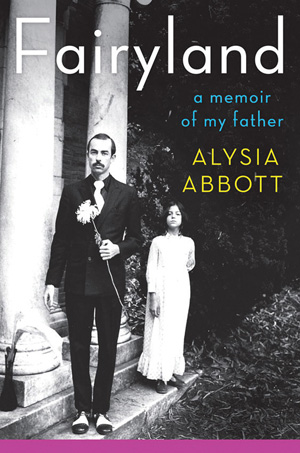“Dad could always make me feel better when the world outside made me feel strange. Dad was the one who loved me best of all.” That’s the unifying sentiment running through Fairyland: A Memoir of My Father, Alysia Abbott’s beautifully written account of being raised by a single gay father, writer and poet Steve Abbott, in San Francisco during the ‘70s and ‘80s. As the book’s title suggests, this is a story about his life as much as it is her own, but what the author has really crafted is an introspective look back at the relationship between a father and daughter who had no one else int he world. And as with any intense relationship, this one comes with its own unique set of difficulties and, at times, resentment.
Abbott reveals in the prologue that, following her father’s death from AIDS-related complications in 1991, she came across 20 years’ worth of his personal journals, which cover the entirety of her life. Using these as primary sources, she’s crafted a compelling narrative filled with details she would otherwise not have known. Abbott’s parents meet as grad students at Emory University, marry despite Steve’s bisexuality, and then have a baby despite his hesitation. When his wife dies in a car crash, Steve decides to raise his two-year-old daughter on his own in San Francisco, where they live a nomadic, financially-strapped lifestyle while he breaks into the local poetry scene and lives an openly gay life. The bulk of Abbott’s memoir covers the next two decades: her difficulties with being raised by a single father, his artistic advancements, her adolescent discomfort with his sexuality, his recovery from drug abuse and subsequent embrace of Buddhism, her experiences at New York University and in Paris, his diagnosis and death. In addition to all this, she nimbly weaves in scenes from gay-rights history and a now-extinct slice of bohemian life.
“You have a writer’s knack for noticing all the fresh, precise details,” Steve writes to his daughter in a letter while she’s living overseas, and this memoir proves his observation to be true. Having also been raised by a single father whose strong suits were not domesticity or even normalcy, I found in the text many similarities to my own childhood: untidy apartments, ill-fitting clothing, an obsession with blending in and not seeming weird, the absence of typical childhood milestones. Steve teaches his young daughter to pee standing up, for instance, but she does not learn to swim, bike, or drive a car until much later in her life. “If he was sometimes a failure as a parent, he was always a noble failure,” Abbott notes. But the author is also brave in presenting an often unflattering portrait of herself as a youth, when she effectively prevents Steve from having romantic relationships during her teenage years, and actively resents having to graduate college early to care for him in his final year of living.
Despite any criticisms of herself or her father, what emerges from the text is a tender, nuanced portrait of two people who sometimes mixed “like fire and oil” yet ultimately loved and needed each other deeply. This is most evident during Abbott’s time living in New York and Paris, when their distance brings them closer together and they frequently write each other letters, in which he shares paternal wisdom (“Secretiveness = loneliness.”) and she shares stories from her budding adult life. As Abbott notes in the present, “the hand-written letters feel like such a gift now.” But with the loving tribute she has written, it feels like the author has offered her late father a similar gift. Early in his journals, Steve notes that he wants to start writing more, “Maybe for Alysia that she might sometime know where her parents were at.” Thanks to her remarkable achievement, we not only know where Steve was at, but where she was at, too.![]()
